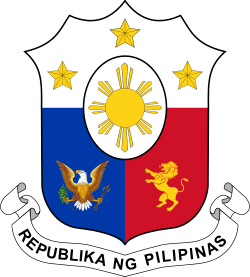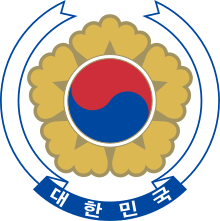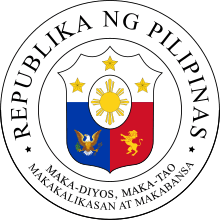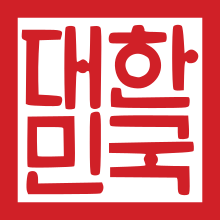Philippines–South Korea relations
The South Korea–Philippines relations (Korean: 대한민국-필리핀 공화국 관계; Hanja: 大韓民國-필리핀 共和國 關係; RR: Daehan Minguk-Pillipin Gonghwaguk Gwangye) (Filipino: Ugnayang Pilipinas at Timog Korea) refers to the bilateral relations between the Republic of Korea and the Republic of the Philippines. South Korea has an embassy in Manila while the Philippines has an embassy in Seoul. The relationship between South Korea and the Philippines can be classified as strong as the two countries have historically been and continue to be close diplomatic and military allies. They are also significant economic partners in terms of trade, immigration, and tourism.
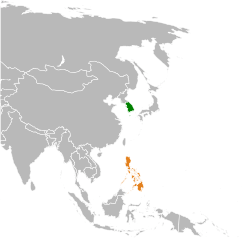 | |
South Korea |
Philippines |
|---|---|
History
Bilateral relations between South Korea and the Philippines were established on 3 March 1949 upon the recognition of Republic of Korea as a sovereign state by the Philippines. The Philippines was the fifth state to recognize the Republic of Korea and the first ASEAN country to establish relations with the new nation.[1][2]
Economic relations
.jpg)
South Korea is the sixth biggest trading partner of the Philippines, while the Philippines is the third most attractive Southeast Asian country for South Korean investors in 2011.[3] South Korea also provides the biggest tourist market for the Philippines. In 2011, Koreans topped the list of tourists in the Philippines, followed by Japanese and Americans.[4]
Military relations
Military relations between the two countries started during the Korean War when the Philippine government sent troops to enforce the United Nations campaign against the communist coalition of North Korea and China.
South Korea is an active arms donor and supplier for the Armed Forces of the Philippines.
They have donated numerous military hardware to the Philippines in the past, such as a number of F-5A/B fighter jets for the Philippine Air Force. These planes have since been decommissioned, but not before seeing ample use in the latter‘s domestic military operations against communist and Muslim separatist insurgents. In addition to this, South Korea had also donated a number of T-41 trainer planes.
In 2014, South Korea donated the ROKS Chungju, a Pohang-class corvette, to the Philippine Navy. She was handed over, refitted, and commissioned as the BRP Conrado Yap (PS-39) on 5 August 2019.[5][6]
The South Korean government also actively fulfills contracts for the Philippines for a variety of military hardware. These range from small arms, armored tactical vehicles, missile frigates, to multirole fighters.
In 2017, South Korea delivered the last batch of the 12 FA-50 Fighting Eagle multirole fighters ordered by the Philippines.[7]
On 16 October 2018, Hyundai Heavy Industries laid down and began construction on BRP Jose Rizal (FF-150), the first missile frigate of her class and one of two that had been placed on order by the Philippine government. She was launched on 23 May 2019 and commissioned in May of the following year. Laying down and construction of the next missile frigate, BRP Antonio Luna (FF-151), also began on 23 May 2019. She was launched on 8 November 2019 and is expected to be commissioned some time in October 2020.[8]
Others
As of 2009, there were 45,000 Filipinos residing in South Korea.[9]
In 2011, the South Korean Ministry of Foreign Affairs and Trade conducted a census and found that there were more than 90,000 South Koreans living in the Philippines, a fall of 16% from 2009 after a period of rapid growth in the population in the preceding decade.[10][11][12]
In July 2020, it was reported that a former ambassador of the Philippines to South Korea was included in the Interpol's Red Notice list. The ambassador submitted his resignation on 16 March 2020 after allegations of sexual harassment of a South Korean woman in December 2019 in Seoul.[13]
Country comparison
See also
References
- "Philippines-South Korea Relations". Philippine Embassy. Retrieved 10 June 2013.
- http://www.korea.net/NewsFocus/Policies/view?articleId=113844
- "PH seeks deeper trade ties with South Korea". The Manila Times. 27 September 2012. Archived from the original on 8 October 2012. Retrieved 20 March 2013.
- Chua, Ryan (27 December 2012). "PH welcomes 1 millionth Korean visitor this year". ABS-CBN News. ABS-CBN Corporation. Retrieved 10 June 2013.
- Agence France Press. "South Korea Is Giving The Philippine Navy A Free Ship As Tensions Rise With China". Insider Inc. Retrieved 28 April 2020.
- Nepomuceno, Priam (6 August 2019). "PH Navy commissions first modern corvette into fleet". Philippine News Agency. Retrieved 28 April 2020.
- "PH Air Force to complete acquisition of 12 FA-50 fighter jets in May". Rappler. 8 April 2017. Retrieved 28 April 2020.
- "FF-150 BRP Jose Rizal - Frigate Acquisition Project". GlobalSecurity.org. Retrieved 28 April 2020.
- 체류외국인 국적별 현황, 《2009년도 출입국통계연보》, South Korea: Ministry of Justice, 2009, p. 262, retrieved 21 March 2011
- 《재외동포 본문(지역별 상세)》, Ministry of Foreign Affairs and Trade, 15 July 2011, p. 104, retrieved 25 February 2012
- 재외동포현황, South Korea: Ministry of Foreign Affairs and Trade, 2009, retrieved 21 May 2009
- Meinardus, Ronaldo (15 December 2005), ""Korean Wave" in Philippines", The Korea Times, archived from the original on 13 January 2006, retrieved 16 February 2007
- Philippine envoy to Seoul resigns over sexual harassment case
- The Speaker is required to not have membership of any political party during his or her tenure as Speaker, by law. Formerly a member of the Democratic
